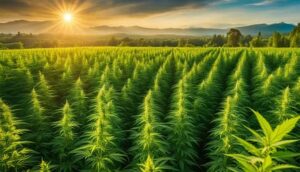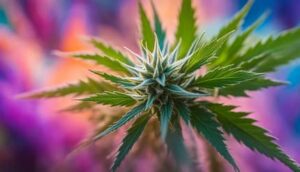
The Environmental Impact Of CBD Production
CBD production has a significant impact on the environment, and understanding its environmental sustainability is crucial for building a greener future. Hemp cultivation and CBD oil production have been found to have positive environmental impacts. Hemp is renewable, biodegradable, and requires minimal water and pesticides. It also has the ability to absorb carbon dioxide from the atmosphere, making it effective in combating climate change. Additionally, hemp can be used as a sustainable source of biofuel and its naturally pest-resistant properties eliminate the need for harmful pesticides. The most environmentally friendly methods of CBD oil extraction include CO2 extraction and ethanol solvent extraction. Purchasing CBD oil from US-sourced companies ensures compliance with FDA regulations and supports sustainable farming practices. However, there is still room for improvement in terms of packaging sustainability and reducing waste in the cannabis industry. Overall, with the right practices in place, hemp and CBD oil production can contribute to a more environmentally friendly future.
 Key Takeaways:
Key Takeaways:
- Hemp cultivation and CBD oil production have positive environmental impacts.
- Hemp is renewable, biodegradable, and has the ability to absorb carbon dioxide.
- CO2 extraction and ethanol solvent extraction are the most environmentally friendly methods of CBD oil extraction.
- Purchasing CBD oil from Eco-Conscious Suppliers promotes sustainability and compliance with regulations.
- Packaging sustainability and waste reduction are areas that still require improvement in the cannabis industry.
Hemp Farming and Its Benefits
Hemp farming offers several environmentally friendly advantages, such as a low carbon footprint and the ability to act as a renewable resource. Hemp, a versatile plant, has gained attention for its positive impact on the environment. Its cultivation requires minimal water and pesticides compared to other crops, making it a sustainable choice for farmers.
One of the key benefits of hemp farming is its low carbon footprint. Hemp has the ability to absorb large amounts of carbon dioxide from the atmosphere during its growth cycle, making it effective in combating climate change. This natural carbon sequestration property makes hemp an invaluable resource in reducing greenhouse gas emissions.
Furthermore, hemp is a renewable resource that can be used in various industries. Its fibers can be transformed into biodegradable textiles, plastics, and construction materials. Hemp seeds are highly nutritious and can be processed into food products like hemp oil and protein powder. Additionally, hemp can serve as a sustainable source of biofuel, reducing our reliance on fossil fuels.
“Hemp is a versatile plant that offers numerous environmental benefits, including its low carbon footprint and renewable resource potential.”
Another advantage of hemp farming is its naturally pest-resistant properties. Hemp plants have evolved to fend off pests, eliminating the need for harmful pesticides that can contaminate soil and water sources. This makes hemp cultivation a more ecologically sound alternative to traditional crops that heavily rely on chemical pesticides.
| The Benefits of Hemp Farming | Key Points |
|---|---|
| Low Carbon Footprint | Hemp absorbs carbon dioxide, reducing greenhouse gas emissions. |
| Renewable Resource | Hemp can be used in various industries, including textiles, plastics, and biofuel. |
| Natural Pest-Resistance | Hemp’s ability to repel pests eliminates the need for harmful pesticides. |
| Minimal Water Usage | Hemp requires less water compared to other crops, making it a sustainable choice. |
In conclusion, hemp farming offers significant environmental benefits. Its low carbon footprint, renewable resource potential, natural pest resistance, and minimal water usage make it a sustainable choice for both farmers and consumers. By supporting the hemp industry, we can contribute to a more environmentally friendly future and reduce our impact on the planet.
Sustainable CBD Extraction Methods
 Minimizing the environmental impact Of CBD Production by Adopting sustainable CBD extraction methods is crucial for reducing the industry’s environmental footprint and addressing the issue of CBD waste. The cannabis industry, as it continues to gain popularity, must prioritize environmentally-friendly practices to ensure a more sustainable future.
Minimizing the environmental impact Of CBD Production by Adopting sustainable CBD extraction methods is crucial for reducing the industry’s environmental footprint and addressing the issue of CBD waste. The cannabis industry, as it continues to gain popularity, must prioritize environmentally-friendly practices to ensure a more sustainable future.
One of the most eco-friendly methods of CBD oil extraction is CO2 extraction. This process utilizes carbon dioxide under high pressure and low temperatures to extract CBD from the hemp plant. Not only does CO2 extraction produce high-quality and pure CBD oil, but it also eliminates the need for harmful solvents or chemicals, minimizing the impact on both the environment and human health.
Another sustainable extraction method is ethanol solvent extraction. Ethanol, a renewable resource derived from plant matter, is used to extract CBD from the hemp plant. This method is considered eco-friendly due to the biodegradable nature of ethanol and its low impact on the environment. It also allows for the extraction of a wide range of cannabinoids, terpenes, and other beneficial compounds from the hemp plant.
By prioritizing sustainable extraction methods, the cannabis industry can significantly reduce its environmental impact and contribute to a greener future. These methods not only minimize waste and pollution but also ensure that the CBD products consumers are purchasing are produced in an ethical and environmentally responsible manner.
| Benefits of Sustainable CBD Extraction Methods |
|---|
| Reduces environmental footprint |
| Minimizes the use of harmful solvents and chemicals |
| Produces high-quality and pure CBD oil |
| Supports ethical and responsible production practices |
Water Usage and Ethical Production
Responsible water usage and ethical production practices are essential for mitigating the environmental impact of CBD production. The cannabis industry has a responsibility to prioritize sustainable water management to ensure the long-term health of our water resources. By implementing water-efficient technologies and practices, such as drip irrigation and rainwater harvesting, CBD producers can minimize their water consumption and reduce the strain on local water supplies.
management to ensure the long-term health of our water resources. By implementing water-efficient technologies and practices, such as drip irrigation and rainwater harvesting, CBD producers can minimize their water consumption and reduce the strain on local water supplies.
In addition to water usage, ethical production practices are crucial for minimizing the negative environmental effects of CBD production. This includes promoting fair labor practices and ensuring worker safety, as well as adhering to strict quality control measures to prevent contamination and minimize waste. Ethical production also involves supporting local communities and sourcing ingredients from sustainable and responsible suppliers.
“Sustainable water management is key in the CBD industry. By implementing water-efficient technologies, such as drip irrigation and rainwater harvesting, we can significantly reduce our water footprint and protect our valuable water resources.” – CBD industry expert
Furthermore, companies can establish partnerships with environmental organizations and invest in research and development to continuously improve their production processes. By prioritizing transparency and accountability, CBD producers can build trust with consumers and demonstrate their commitment to minimizing the environmental impact of CBD production in the future.
| Benefits of Responsible Water Usage and Ethical Production | Actions to Take |
|---|---|
| Conserves precious water resources | Implement water-efficient technologies like drip irrigation and rainwater harvesting |
| Reduces strain on local water supplies | Monitor water usage and implement strict water management practices |
| Promotes fair labor practices | Ensure worker safety and fair wages |
| Minimizes waste and contamination | Adhere to strict quality control measures |
| Supports local communities and sustainable sourcing | Foster partnerships with local organizations and responsible suppliers |
Conclusion
Water usage and ethical production practices are key considerations for the CBD industry. By implementing responsible water management strategies and promoting fair labor practices, CBD producers can minimize their environmental impact and contribute to a more sustainable future. It is imperative for companies to prioritize transparency and accountability, partnering with environmental organizations and investing in research to continuously improve their production processes. Through these efforts, the CBD industry can play a significant role in mitigating its environmental impact and fostering a more ethical and sustainable approach to CBD production.
Organic CBD and Pesticide Reduction rating for organic CBD products contribute to a more sustainable and pesticide-free CBD industry. Organic CBD production focuses on cultivating hemp plants without the use of synthetic pesticides, ensuring a healthier and more environmentally friendly end product.
Hemp cultivation itself has been found to naturally repel pests, reducing the need for harmful chemicals. This natural pest resistance makes organic CBD an attractive choice for consumers looking for high-quality, pesticide-free products.
By supporting organic CBD, consumers are not only prioritizing their personal health but also contributing to a more sustainable future. Organic farming practices minimize the negative impact on the environment, promoting soil health and biodiversity. Additionally, organic CBD production helps reduce the overall usage of harmful pesticides, protecting ecosystems and supporting the well-being of pollinators such as bees.
| Benefits of Organic CBD |
|---|
| Reduced exposure to synthetic pesticides |
| Promotion of soil health and biodiversity |
| Support for pollinator populations |
Packaging Sustainability and Waste Reduction
 Addressing packaging sustainability and waste reduction is crucial for achieving an environmentally-friendly CBD industry. As the demand for CBD products continues to rise, it’s important to consider the environmental impact of the packaging materials used and the waste generated throughout the production process.
Addressing packaging sustainability and waste reduction is crucial for achieving an environmentally-friendly CBD industry. As the demand for CBD products continues to rise, it’s important to consider the environmental impact of the packaging materials used and the waste generated throughout the production process.
One approach to improving packaging sustainability is by using eco-friendly materials. For instance, brands can opt for biodegradable packaging made from plant-based materials such as hemp or cornstarch, which decompose naturally without causing harm to the environment. This not only reduces the reliance on non-renewable resources but also decreases the amount of waste that ends up in landfills.
Another strategy is to encourage recycling and reusability. By incorporating symbols and instructions for proper recycling on product packaging, consumers can easily identify how to dispose of it responsibly. Additionally, brands can offer refillable or reusable packaging options, ensuring that customers can reduce their overall waste footprint while still enjoying their CBD products.
| Key Strategies for Packaging Sustainability and Waste Reduction | Benefits |
|---|---|
| Using eco-friendly materials (e.g., hemp or cornstarch) | – Decreases reliance on non-renewable resources – Reduces landfill waste |
| Encouraging recycling and reusability | – Promotes responsible disposal – Reduces overall waste footprint |
“Addressing packaging sustainability and waste reduction is crucial for achieving an environmentally-friendly CBD industry.”
Furthermore, collaboration within the industry is essential for driving change. By sharing best practices and working together, CBD companies can collectively find innovative solutions to reduce packaging waste. This could involve establishing industry-wide standards for sustainable packaging or creating a centralized recycling program that allows consumers to easily return used packaging for proper disposal.
In conclusion, while the CBD industry has made significant strides in terms of sustainability, there is still work to be done when it comes to packaging sustainability and waste reduction. By adopting eco-friendly materials, promoting recycling and reusability, and fostering collaboration, the industry can continue to move towards a more environmentally-conscious future.
Supporting US-Sourced CBD for Sustainable Farming
 Purchasing CBD oil from US-sourced companies not only ensures compliance with regulations but also supports sustainable farming practices. By choosing CBD products that are locally sourced, consumers can contribute to reducing the carbon footprint associated with transportation and promote responsible agricultural practices within their own country.
Purchasing CBD oil from US-sourced companies not only ensures compliance with regulations but also supports sustainable farming practices. By choosing CBD products that are locally sourced, consumers can contribute to reducing the carbon footprint associated with transportation and promote responsible agricultural practices within their own country.
Supporting US-sourced CBD companies also helps to uphold ethical standards in the industry. The United States has strict regulations and standards in place for CBD production, ensuring that products are safe, reliable, and of high quality. By purchasing from these companies, consumers can have confidence in the integrity and transparency of the CBD they are using.
Furthermore, supporting sustainable farming practices is crucial for the long-term viability of the CBD industry. US-sourced companies are more likely to adhere to sustainable farming methods, such as organic cultivation and responsible water management. These practices help to minimize the environmental impact of CBD production, protect natural resources, and preserve biodiversity.
In summary, choosing CBD oil from US-sourced companies not only ensures compliance with regulations but also supports sustainable farming practices. By making this conscious decision, consumers can contribute to a more environmentally friendly future and promote the growth of a responsible and ethical CBD industry.
| Benefits of Supporting US-Sourced CBD for Sustainable Farming |
|---|
| Reduces carbon footprint associated with transportation |
| Upholds ethical standards in the industry |
| Promotes responsible agricultural practices |
| Ensures compliance with strict regulations and standards |
| Supports organic cultivation and responsible water management |
Conclusion
In conclusion, hemp and CBD oil production have the potential to positively impact the environment, but there is still work to be done to achieve a fully sustainable and eco-friendly industry. The cultivation of hemp, with its renewable and biodegradable properties, offers numerous benefits in terms of reducing carbon footprint and minimizing water usage and pesticide requirements. Additionally, hemp’s ability to absorb carbon dioxide from the atmosphere makes it a valuable tool in the fight against climate change.
Furthermore, sustainable CBD extraction methods, such as CO2 extraction and ethanol solvent extraction, have emerged as environmentally friendly alternatives to conventional extraction processes. These methods minimize the use of harmful chemicals and prioritize the conservation of resources.
Supporting US-sourced companies when purchasing CBD oil not only ensures compliance with FDA regulations but also promotes sustainable farming practices. By choosing products from companies that prioritize ethical and environmentally friendly production standards, consumers can contribute to the development of a more sustainable CBD industry.
However, there are still areas that require improvement. Packaging sustainability and waste reduction remain a significant challenge within the cannabis industry. It is crucial for companies to explore alternative packaging materials and adopt strategies that minimize waste generation. By supporting brands that prioritize sustainable packaging practices, consumers can play a vital role in driving positive change in the industry.
In summary, while hemp and CBD oil production show promising potential for positive environmental impact, it is essential for the industry to continue its efforts to achieve comprehensive sustainability. Through ongoing innovation and a commitment to environmental responsibility, hemp, and CBD oil production can contribute to a more sustainable and eco-friendly future.
FAQ
What are the environmental benefits of hemp farming?
Hemp farming has several environmental benefits. It is a renewable resource, biodegradable, and requires minimal water and pesticides. Hemp also absorbs carbon dioxide from the atmosphere, making it effective in combating climate change.
What are the most environmentally friendly CBD extraction methods?
The most environmentally friendly CBD extraction methods are CO2 extraction and ethanol solvent extraction. These methods minimize waste and reduce the use of harmful chemicals.
How can CBD production contribute to water conservation and ethical practices?
CBD production can contribute to water conservation by implementing responsible water management practices. Supporting companies that prioritize ethical production standards also ensures that water usage is minimized and resources are used responsibly.
What are the benefits of choosing organic CBD products?
Choosing Organics means it is produced without synthetic pesticides. This reduces the negative impact on the environment and promotes healthier farming practices.benefits of choosing organic CBD products
How can packaging sustainability and waste reduction be improved in the CBD industry?
The CBD industry can improve packaging sustainability by using alternative materials that are more environmentally friendly. Brands can also prioritize waste reduction strategies to minimize their environmental footprint.
Why is it important to support US-sourced CBD for sustainable farming practices?
Supporting US-sourced CBD products ensures compliance with FDA regulations and supports sustainable farming practices. Buying from companies that prioritize sustainability and ethics helps promote a more environmentally friendly future.






